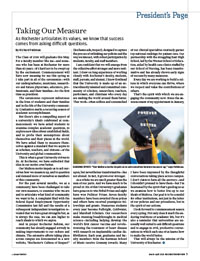Letters
 GUIDING SPIRIT: “Our Meliora motto impels us to ask ourselves how we measure up,” says Feldman. (Photo: J. Adam Fenster)
GUIDING SPIRIT: “Our Meliora motto impels us to ask ourselves how we measure up,” says Feldman. (Photo: J. Adam Fenster)The Class of 2018 will graduate this May. For a faculty member like me—and someone who has been at Rochester for more than 40 years—it’s hard not to be swept up by the excitement. Commencement will have new meaning for me this spring as I take part in all of the ceremonies—with our undergraduates, musicians, researchers and future physicians, educators, professionals, and their families—for the first time as president.
The ceremonies represent milestones in the lives of students and their families and in the life of the University community. Graduation marks a recurring season of academic accomplishment.
But there’s also a compelling aspect of a university’s ideals celebrated at commencement: we have asked students to examine complex academic questions, to explore new ideas about established fields, and to probe their assumptions about themselves and their places in the world. We have asked them to measure themselves against a standard that we aspire to as scholars, teachers, and citizens—of the University and global communities.
This is what a great University strives to do. At Rochester, we have embodied that idea in our motto: ever better.
Our Meliora motto impels us to ask ourselves how we measure up, and to question and demand more of ourselves as members of this community.
For the past several months, we as a community have been challenged to take our own measure, to examine who we are and to articulate what kind of community we want to be. A complaint filed with the federal Equal Employment Opportunity Commission last fall and the results of a subsequent independent investigation revealed that we have great strengths but, as is always the case, we can aim higher to reach ideals to which we aspire.
And in proper Rochester fashion, our community has already engaged actively in making improvements to our culture and climate. The extensive efforts taking place across campus are documented in a new website, “Rochester’s Culture of Respect” (Rochester.edu/respect), designed to capture the process of rethinking our policies and the way we interact, with robust participation by students, faculty, and staff members.
I am confident that we will emerge from the collective effort stronger and more resilient. I draw on long experience of working closely with Rochester’s faculty, students, staff, parents, and alumni. I know firsthand that the University is made up of an extraordinarily talented and committed community of scholars, researchers, teachers, performers, and clinicians who every day are making the world around them better. That work—often selfless and unremarked upon, but nevertheless transformative—has not abated. In fact, it grows ever stronger.
As a whole we are much greater than the sum of our parts. And we have much to be proud of. Six of this University’s graduates have gone on to win Nobel Prizes and eight have won Pulitzer Prizes. Seven faculty members have been awarded those prizes and others have received prestigious fellowships and grants. Numerous students every year become Fulbright, Goldwater, and Marshall Scholars. Our researchers make stunning breakthroughs in medical science—including helping develop the world’s first cancer vaccine and revolutionizing the treatment of heart disease with research on implantable cardiac defibrillators. Each year, graduates and faculty members from the Eastman School of Music receive Grammy Awards. Many of our clinical specialties routinely garner top national rankings for patient care. Our partnership with the struggling East High School, led by the Warner School of Education, aided by health care clinics staffed by our School of Nursing, has been transformative and has already shown early signs of success by many measures.
Every day we are working to build a culture in which everyone can thrive, where we respect and value the contributions of others.
That’s the spirit with which we are engaging the community now. Since the announcement of my appointment in January, I have been impressed by the thoughtful conversations taking place across campus. I don’t claim to have all the answers—and I shouldn’t pretend to have them—but I’m heartened by the spirit that’s guiding us as we examine how to better live up to our ideals of Meliora. Our goal is to be a model for other institutions, not just in the letter of our policies and our procedures, but in the spirit of our actions.
I look forward to commencement season every spring. Not only does it mark the enduring traditions of academic life, but it’s also a reminder that universities are unusually well suited to ask difficult questions and to engage in civil, productive conversations in which each one of us learns how to make the world better.
That will always be the mission of the University of Rochester.

